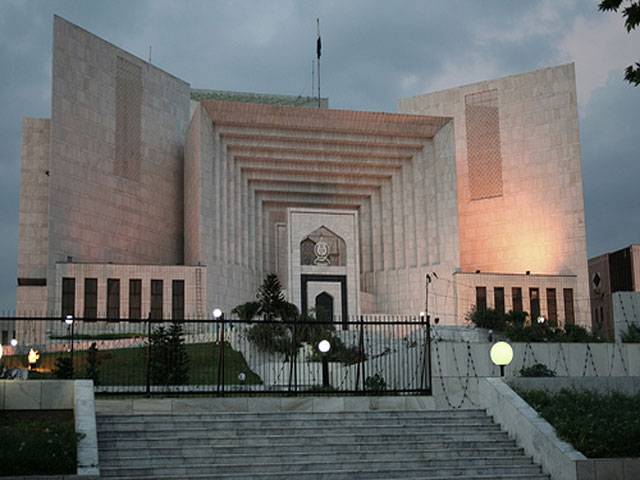ISLAMABAD - The Supreme Court Thursday formulated three questions to decide whether the civilian or the military courts should hear a case of serving army men who commit an offence under the Pakistan Penal Code (PPC).
Justice Jawwad S Khawaja, heading a three-member bench, which heard the case of 35 undeclared internees taken away allegedly by army officials from Malakand Internment Centre, directed the Attorney General for Pakistan and KP Advocate General to assist the court regarding the matter.
In March this year an FIR under Section 346 of PPC was registered on behalf of Defence Minister Khawaja Asif in a Malakand police station against Naib Subedar Amanullah Baig and other army officials on charges of taking away 35 prisoners from the internment centre in Malakand Fort.
The KP police was directed to investigate the matter but on March 25, 2014 the Dir magistrate was informed about a request from General Officer Commanding, Commander Operational Area Swat, to transfer the case of Amanullah to GOC. The deputy commissioner, who is also Commandant Malakand, complied with the request. As a consequence, the case with the Malakand Levis was closed and the documents of the case were forwarded to army authorities on March 27.
The SC bench stated that prima facie the military authorities on the assumption that they have this authority had sought the transfer of the case on the basis of Section 94 of the PAA, Section 549 of the Criminal Procedure Code (CrPC) and Rule 374 of the Army Regulations read with Pakistan Army Act (Rule) 168. Similarly, the Malakand DC transferred the case to the army authorities.
However, the court said the letter of GOC and response of the DC raised questions of constitutional and legal significance. The court formulated three questions that when a serving army man commits an offence under the PPC whether the ordinary or the military court should hold its trial. Whether the ordinary courts are obliged to concede to the request of army authority or it is their discretion to determine whether or not to accept the request of army authorities for case transfer. What is the basis to consider/allow or decline such requests?
Earlier, when the court heard the case before interval, Attorney General Aslam Butt submitted his reply regarding FIRs, saying the FIR could be lodged against serving army official according to Pakistan Army regulations. Justice Jawwad remarked that there was no doubt that an FIR could be registered against a serving army man, but the question was whether the case would be heard by an army court or a civilian court. Justice Gulzar remarked that there should be rules and regulations regarding handing over of army personnel to military authorities from the magistrate. Justice Khawaja said if the magistrate handed over a detained army official to military authorities, he should have provided reasons for it.
After the break, KP Advocate General Latif Yousafzai told the court that the custody of the remaining prisoners had been given to the army authorities and their cases are at the final stage. Justice Jawwad sarcastically said the KP provincial government had not been absolved by saying that it had handed over the prisoners to the military court. “The state, in this case the province, has to protect its citizens and it has to assert its rights in such a situation,” Justice Jawwad said.
Justice Jawwad remarked that even they (military courts) decide the matter but they have to see whether it could be judicially reviewed. The KP AG replied that this issue could be taken care of under Section 374 of the Army Rules. Justice Gulzar stated if the prisoners from Malakand internment centre were sent for court martial then it would be the initial stage.
The bench had been hearing the 35 detainees’ case since August 5, 2013 and it passed a number of orders for their recovery. Around 14 missing persons out of the total 35 were produced before the court. Some of the remaining persons were said to be accounted for but were not produced before the court. Two of them have reportedly died. The case was adjourned until May 26.
A day ago, on Wednesday, the apex court had expressed its displeasure over the government’s understanding that the civil courts apparently could not try serving military men. The issue has gained tremendous significance as it’s not just the case of missing persons because a decision in the case would serve as precedence in other cases too.
Friday, April 19, 2024
SC asks if cases transfer to mily courts mandatory
Missing persons | Seeks set procedure to handle cases involving soldiers | Directs AG, KP advocate general to help find answers

Caption: SC asks if cases transfer to mily courts mandatory
2:23 PM | April 19, 2024
President, PM condemn suicide blast, firing in Karachi
2:24 PM | April 19, 2024
Fly Jinnah launches another international route
2:23 PM | April 19, 2024
Interior minister directs foolproof security for Chinese nationals
2:20 PM | April 19, 2024
UNICEF to provide $20m for youth projects in Pakistan
2:04 PM | April 19, 2024
Maryam reviews progress on Nawaz Sharif IT City project in Lahore
2:04 PM | April 19, 2024
A Tense Neighbourhood
April 19, 2024
Dubai Underwater
April 19, 2024
X Debate Continues
April 19, 2024
Hepatitis Challenge
April 18, 2024
IMF Predictions
April 18, 2024
Kite tragedy
April 19, 2024
Discipline dilemma
April 19, 2024
Urgent plea
April 19, 2024
Justice denied
April 18, 2024
AI dilemmas unveiled
April 18, 2024
ePaper - Nawaiwaqt
Advertisement
Nawaiwaqt Group | Copyright © 2024





